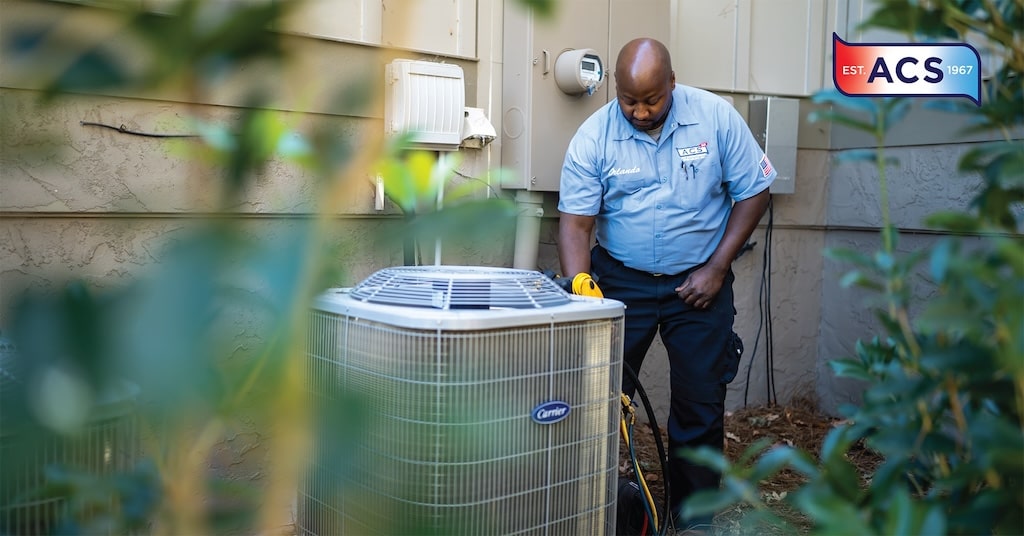When it comes to utility bills, not knowing what to expect is a red flag. While some months might reap low costs, others may show an influx of costly energy consumption. And soon enough, you may get tired of expecting the unexpected.
An at-home energy audit is an effective way to evaluate your home’s energy consumption and reduce utility costs. At ACS, we offer exclusive industry insight and premium residential and commercial HVAC maintenance to optimize your comfort and costs. However, if you’d like to take matters into your own hands before calling professionals, allow us to give you some tips. Below, read our comprehensive guide on how to conduct an at-home energy audit to save big on energy costs.
Identify Air Leaks
Air leaks are a common culprit for energy overconsumption, and unfortunately, they are often hard to spot. Leaks can go undetected for weeks, months, and even years if you don’t have your eyes peeled. As a home or business owner, you’ll want to monitor the following areas for potential leaks: junctions between different construction materials, doors and windows, electrical and plumbing fixtures, and fireplace dampers. If you are aware of vulnerable areas, you’ll be more likely to prevent a leak before it wreaks havoc on your energy bills. According to the U.S. Department of Energy, proper air sealing techniques can cut a household’s annual energy consumption by 10-20%. Sealing leaks is a simple task that reaps incredible benefits in the long run, making it an essential step of your at-home energy audit!
Check Your Insulation
Low insulation can drive up energy bills through cold and warm months. If your insulation is poor throughout the summer, heat will more easily enter your home and cause your air conditioner to work harder. Similarly, inadequate insulation in the winter will allow heat to escape from your home and put your heating system on overdrive. Your attic should be a top property in your energy audit, as you should triple-check that its floor, ceiling, and walls are adequately insulated. If you notice gaps in insulation, you can fill these spots with expanding foam and fill smaller openings with caulk. And while you’re there, you should also check for moisture, as water damage can make insulation effective, stimulate mold growth, and even cause structural damage to your home.
Inspect Heating and Cooling
One of the most critical steps in your energy audit is to inspect your heating and air conditioning. Because these are the most significant energy expenses in most homes and businesses, heating and cooling systems should be top of mind when conducting an energy assessment. In most cases, systems require easy updates like changing an air filter or checking ductwork for leaks or broken seals. While we advise home and business owners to check these systems periodically, routine maintenance is the best way to optimize your heating and cooling system’s energy efficiency. At ACS, we offer comprehensive maintenance service agreements to ensure greater HVAC efficiency year-round and rid your energy audits of any unexpected surprises.
Check Your Lightinghttps://theairconditioningspecialist.com/comfort-club-maintenance-plans/maintenance-service-agreement/
Though lighting makes up a small percentage of your energy bill, it can still wrack up unnecessary costs. Leaving lights on when you’re not home or throughout the daytime is an easy way to drive up your energy bills, especially if your bulbs are not energy-efficient. A good rule of thumb for your at-home energy audit is to replace your light bulbs with energy-saving incandescent, compact fluorescent bulbs, or LEDs. And for a little extra touch, you could also install occupancy sensors, dimmers, or timers to reduce the operating hours of your light bulbs and maximize your savings.
Evaluate Electronics and Appliances
For many home and business owners, it’s common to leave various electronics and appliances plugged in even when they’re not in use. However, these devices still use energy while in standby mode and can account for a significant portion of your energy costs. If an appliance has an indicator light, digital clock, charger, or AC power adapter on the cord, it’s likely contributing to your energy bill. To cut these costs from your monthly utility expenses, consider the following strategies:
- Unplug electronics when not in use.
- Take breaks from using electronics throughout the day.
- Replace old appliances with more energy-efficient models.
- Turn off the television when no one is watching it.
These simple yet effective energy-saving measures are easy to implement and can reap significant savings in the long run.
HVAC Heating and Cooling with ACS
At ACS, we are committed to helping you get the most out of your heating and cooling systems without breaking the bank. From monitoring air filters to scheduling annual tune-ups, there are many ways to sustain your HVAC system’s performance so that your bills stay consistent. Contact our team today for premium HVAC maintenance in Covington, Milledgeville, and surrounding areas.



